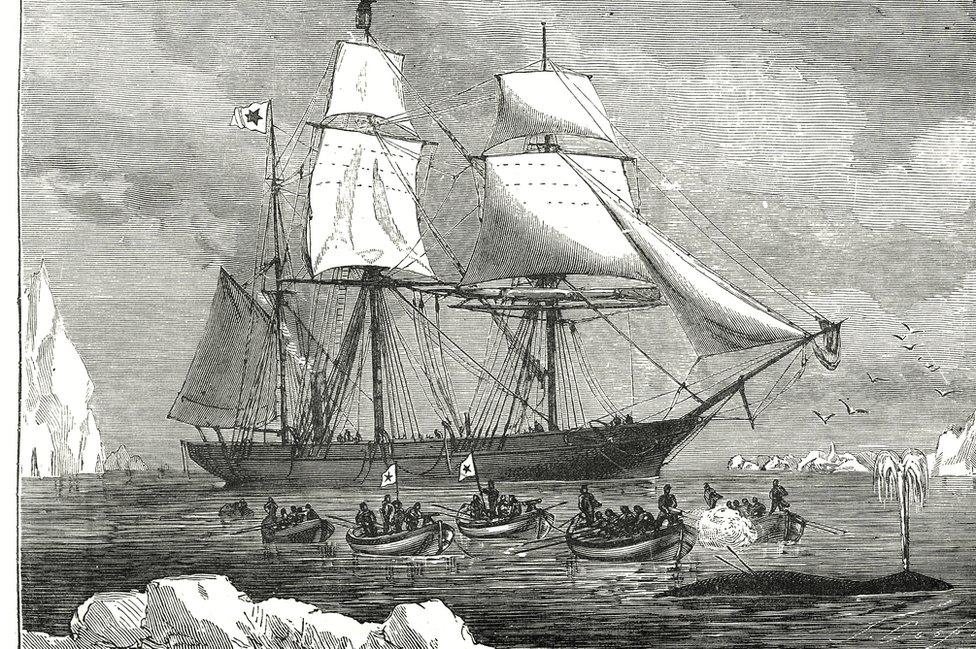The Scottish postman behind 'Sea Shanty TikTok'
- Published
'Everybody can join in a sea shanty'
When Scottish postman Nathan Evans is not delivering parcels, he is posting viral videos on TikTok.
The Royal Mail worker has emerged as the source of a worldwide trend on the video sharing app.
But instead of dance videos, life hacks and make-up tutorials, the 26-year-old from Airdrie in North Lanarkshire has become "TikTok famous" for singing ancient sea shanties.
Since December, Nathan has racked up millions of views for his sailor songs and he is responsible for what is being called "Sea Shanty TikTok".
The centuries-old songs were traditionally sung by sea farers around the work, but after a few requests to Nathan's social media accounts and other landlubbers duetting, the craze grew.
Fans have even taken to Twitter to declare 2021 the year of the sea shanty.
Nathan told the BBC Radio 4's Today programme: "It is crazy and has gone much further than I ever thought it would go.

Airdrie singer Nathan Evans has struck social media gold with his sea shanties
"I did a sea shanty back in July 2020, just because someone had asked in a comment under one of my videos.
"So I uploaded that and it reached 1.1m views. I thought there must have been a demand.
"People were looking forward to more and they were commenting underneath every video after that saying can you sing this one, can you sing that one - it was just requests from people for me to sing them."
After his first video "Leave her Johnny", he posted another called "The Scotsman" which has gained 2.8m views and then his biggest video to date "The Wellerman" which was posted in December and has has been watched 4.3m times.
It has also been duetted countless time and been turned into a collaboration with other TikTokers.
Allow X content?
This article contains content provided by X. We ask for your permission before anything is loaded, as they may be using cookies and other technologies. You may want to read X’s cookie policy, external and privacy policy, external before accepting. To view this content choose ‘accept and continue’.

The song has been traced back to New Zealand in the 19th century.
"It's about people on a ship and they are whaling and trying to catch this whale," Nathan said.
"And they are saying that when they catch it, they will get it on board and sing about when the 'tonguing is done' - when it has been butchered for the meat. It is not the most glorious of songs."
What is a sea shanty?
Sea shanties were work songs, sung by merchant seamen as they carried out work tasks such as hoisting sails.
The most well-known shanty is probably Drunken Sailor.
"When they were originally sung they were designed to keep everyone in time with the work they were doing," Nathan said.
"So I think its the fact you can get everyone involved, everyone can join in, you don't need to necessarily be able to sing, the words are simple and it is just the beat and the voices. I think it's a bit of everything that appeals to everyone."

The shanties were sung by merchant seaman to keep in time on tasks
The Wellerman is believed to be about a Sydney whaling company called Weller Bros, whose employees and ships were called Wellermen.
Its lyrics describe a supply ship bringing "sugar and tea and rum" to the whaling crew in the seas off New Zealand.
On TikTok, videos tagged #seashanty have had more than 70 million views.
Google Trends even tweeted on Tuesday that "sea shanties" was being searched for more than it ever had in search engine's history.
Allow X content?
This article contains content provided by X. We ask for your permission before anything is loaded, as they may be using cookies and other technologies. You may want to read X’s cookie policy, external and privacy policy, external before accepting. To view this content choose ‘accept and continue’.

Nathan, who composes and performs his own songs as well as folk songs and pop covers, is hoping this attention will help boost his music career.
It has already seen him recognised on his delivery rounds.
"Three or four people have recognised me," he said. "One day I was delivering a parcel to a lady and as I was handing it over she gave me a funny look and said I've seen you on my phone."
Fans will be happy to hear there are more in the pipeline as the demand increases and playlists pop up on music apps like Spotify.
Nathan said: "There's one called Roll The Old Chariot and that will be my next one."